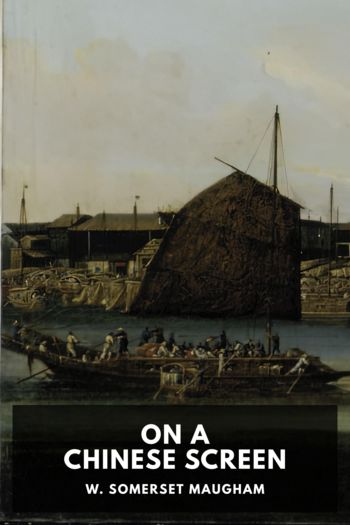Of Human Bondage by W. Somerset Maugham (classic english novels .TXT) 📕

- Author: W. Somerset Maugham
Book online «Of Human Bondage by W. Somerset Maugham (classic english novels .TXT) 📕». Author W. Somerset Maugham
Philip was overwhelmed by so much gentlemanliness: in East Anglia they knew who were gentlemen and who weren’t, but the gentlemen didn’t talk about it.
XXXVIIAt first the novelty of the work kept Philip interested. Mr. Carter dictated letters to him, and he had to make fair copies of statements of accounts.
Mr. Carter preferred to conduct the office on gentlemanly lines; he would have nothing to do with typewriting and looked upon shorthand with disfavour: the office-boy knew shorthand, but it was only Mr. Goodworthy who made use of his accomplishment. Now and then Philip with one of the more experienced clerks went out to audit the accounts of some firm: he came to know which of the clients must be treated with respect and which were in low water. Now and then long lists of figures were given him to add up. He attended lectures for his first examination. Mr. Goodworthy repeated to him that the work was dull at first, but he would grow used to it. Philip left the office at six and walked across the river to Waterloo. His supper was waiting for him when he reached his lodgings and he spent the evening reading. On Saturday afternoons he went to the National Gallery. Hayward had recommended to him a guide which had been compiled out of Ruskin’s works, and with this in hand he went industriously through room after room: he read carefully what the critic had said about a picture and then in a determined fashion set himself to see the same things in it. His Sundays were difficult to get through. He knew no one in London and spent them by himself. Mr. Nixon, the solicitor, asked him to spend a Sunday at Hampstead, and Philip passed a happy day with a set of exuberant strangers; he ate and drank a great deal, took a walk on the heath, and came away with a general invitation to come again whenever he liked; but he was morbidly afraid of being in the way, so waited for a formal invitation. Naturally enough it never came, for with numbers of friends of their own the Nixons did not think of the lonely, silent boy whose claim upon their hospitality was so small. So on Sundays he got up late and took a walk along the towpath. At Barnes the river is muddy, dingy, and tidal; it has neither the graceful charm of the Thames above the locks nor the romance of the crowded stream below London Bridge. In the afternoon he walked about the common; and that is gray and dingy too; it is neither country nor town; the gorse is stunted; and all about is the litter of civilisation. He went to a play every Saturday night and stood cheerfully for an hour or more at the gallery-door. It was not worth while to go back to Barnes for the interval between the closing of the Museum and his meal in an A.B.C. shop, and the time hung heavily on his hands. He strolled up Bond Street or through the Burlington Arcade, and when he was tired went and sat down in the Park or in wet weather in the public library in St. Martin’s Lane. He looked at the people walking about and envied them because they had friends; sometimes his envy turned to hatred because they were happy and he was miserable. He had never imagined that it was possible to be so lonely in a great city. Sometimes when he was standing at the gallery-door the man next to him would attempt a conversation; but Philip had the country boy’s suspicion of strangers and answered in such a way as to prevent any further acquaintance. After the play was over, obliged to keep to himself all he thought about it, he hurried across the bridge to Waterloo. When he got back to his rooms, in which for economy no fire had been lit, his heart sank. It was horribly cheerless. He began to loathe his lodgings and the long solitary evenings he spent in them. Sometimes he felt so lonely that he could not read, and then he sat looking into the fire hour after hour in bitter wretchedness.
He had spent three months in London now, and except for that one Sunday at Hampstead had never talked to anyone





Comments (0)